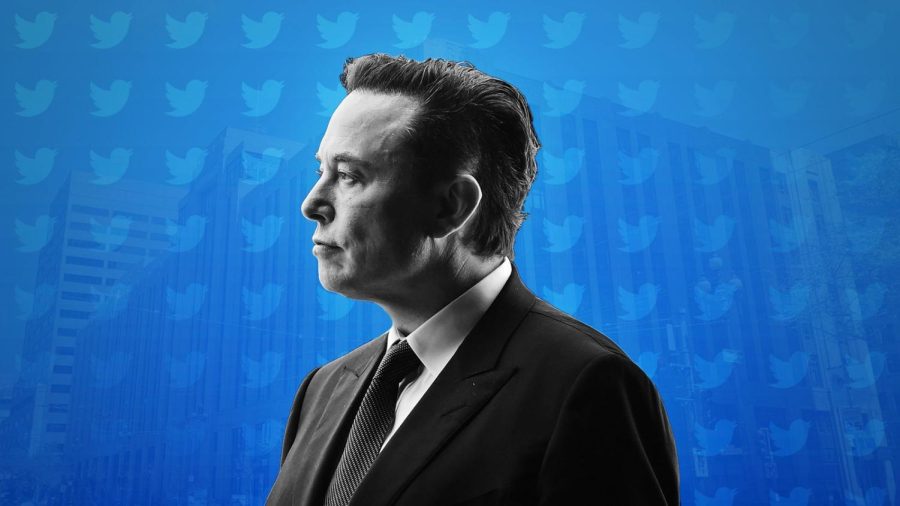Elon Musk: The New King of Twitter
In October, business mogul Elon Musk sealed the deal on his purchase of Twitter. However, did his subsequent actions regarding the platform really bring Twitter to the next level, as he had hoped? And, what can America expect to see from him next?
November 27, 2022
On April 14, 2022, billionaire Elon Musk began what would become a 6-month voyage to acquire the 41 billion-dollar social media behemoth Twitter.
However, since the finalization of the deal on October 27, the American public has taken staunch positions, both positive and negative, on the potential consequences of Musk’s purchase—largely due to his previous claims about allowing formerly blocked accounts (such as that of President Donald Trump) back onto the platform.
Long before buying Twitter, Musk had expressed his discontent with the platform, particularly about its policies regarding content moderation and free speech.
Musk argued that Twitter must prioritize the protection of free speech, as Twitter served as “a defacto public town square.” He even expressed consideration for starting a new platform to protect free speech.
Simultaneously, Musk was increasing his influence over Twitter. On March 14, Musk purchased 9.2% of Twitter’s shares, worth $2.89 billion. This made Musk Twitter’s largest shareholder.
After enormous speculation over Musk’s next move, he announced a $44 billion offer to buy Twitter in April. And, after some deliberation, Twitter accepted Musk’s offer, which was well above the company’s value.
After buying Twitter, Musk went on to make a series of controversial decisions. He laid off half of Twitter’s workforce, arguing that the bloated workforce was making Twitter unprofitable, and later went on to fire more workers who were critical of him on social media.
However, perhaps Musk’s biggest change would come with his establishment of a paid verification system. Under this system, Twitter users could pay $8 a month to be verified—which Musk stated was necessary to increase non-advertiser revenue. However, as users began to use the new system to impersonate famous figures and companies, Musk was forced to halt the new system.
And despite Musk’s previous advocacy for free speech absolutism, he began to crack down on parody accounts, especially ones impersonating him using the short-lived paid verification system. Musk stated that any parody account which does not specify that they are a parody would be permanently suspended.
Now, Musk’s acquisition brought waves of public opinion along with it—both praise and criticism towards the billionaire’s purchase. Across the political spectrum, left-leaning and right-leaning citizens tend to share convictions among their respective political circles around Musk’s decision to unilaterally control the platform.
Musk has consistently been against “censorship” on the platform, and claimed that banning accounts for violating platform guidelines or spreading incendiary speech “undermined democracy.”
In light of President Donald Trump’s account being reinstated on the platform, many Democrats are afraid that Musk taking control will reduce the regulations preventing disinformation from dispersing throughout the platform—or even resulting in these formerly banned accounts retaking their spot on Twitter.
And even former President Barack Obama has expressed his disapproval of Musk’s acquisition, claiming that “One billionaire should not be able to turn the world upside down just because he plays by a different set of rules.”
However, although those on the Left have been looking at the purchase with disfavor, countless right-leaning citizens have been celebrating the new development. Republican congresspeople such as Marjorie Taylor Greene and Ted Cruz have voiced their support for Musk, declaring that he would expand free speech in the world of social media.
In a recent appearance on Fox News, Texas Representative Cruz claimed that Musk buying Twitter was “one of the most significant developments for free speech in modern times.”
While Elon Musk’s vision for Twitter is based on developing the app to the fullest extent by blocking spam bots, protecting freedom of speech, and building an “everything app,” his actions many argue could create irreparable harm to the future of Twitter.
Considering the future of Twitter as a platform and as a company raises the unavoidable question of “What else is Musk planning to do?”
Many of Musk’s decisions have had negative effects on Twitter’s standing. After Musk’s acquisition, Twitter saw a substantial increase in hate speech, and conspiracy theories as Musk promised to decrease content moderation. This led several advertisers, concerned about preserving their reputations, to halt spending on Twitter, decreasing Twitter’s revenue in the second quarter.
Furthermore, there may be a remote possibility of Musk asking Twitter users to pay for each “tweet” they post, using amounts of the cryptocurrency “DogeCoin,” owned by Musk himself.
Through the last month, Musk has proved that he can administer his authority over the social media juggernaut that Twitter has become—despite the flow of criticism he has received for his controversial decisions regarding his workforce.
Nevertheless, his “reign” as owner has only just begun, and taking a closer look at Musk’s ultimate objectives for Twitter under his leadership reveals that he has significant ambitions—and hurdles to overcome—for the company. Whether he will be able to live up to America’s expectations, though, is still a question that remains unanswered.
